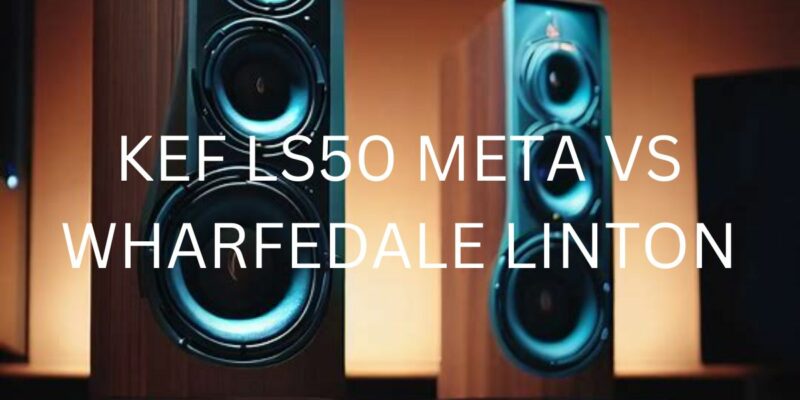In the realm of high-fidelity audio, two names stand out among enthusiasts and audiophiles: KEF and Klipsch. Both companies have long histories of delivering exceptional sound quality and engineering excellence. In this article, we delve into a comparison between two iconic speakers: the KEF LS50 Meta and the Klipsch Heresy IV. With their unique design philosophies and impressive specifications, these speakers are sure to captivate any audio aficionado. So, let’s dive into the details and explore the differences, strengths, and weaknesses of these two audio titans.
Design and Construction
The KEF LS50 Meta boasts a minimalist and sleek design, with its curved cabinet and Uni-Q driver array at the heart of its visual appeal. The speaker’s cabinet is built with a constrained layer damping system, effectively reducing unwanted vibrations for enhanced clarity. On the other hand, the Klipsch Heresy IV exudes a more vintage and classic aesthetic, featuring a solid wood construction and a horn-loaded tweeter. The Heresy IV’s timeless design and craftsmanship pay homage to Klipsch’s heritage.
Sound Performance
When it comes to sound quality, both speakers offer unique characteristics that cater to different listening preferences. The KEF LS50 Meta features KEF’s patented Uni-Q driver array, which places the tweeter concentrically within the midrange driver. This arrangement results in exceptional coherence, precise imaging, and a wide sweet spot. The LS50 Meta reproduces detailed highs, balanced mids, and punchy bass, making it an excellent choice for critical listening and studio monitoring.
In contrast, the Klipsch Heresy IV embraces a more robust and dynamic sound signature. The horn-loaded tweeter of the Heresy IV provides exceptional efficiency and directivity, resulting in a highly energetic and engaging soundstage. The speaker’s larger woofer produces powerful low-frequency response and impressive dynamics, making it well-suited for rock, jazz, and other genres that benefit from a lively and impactful sound.
Room Acoustics and Placement
Room acoustics play a crucial role in speaker performance, and both the LS50 Meta and the Heresy IV have different requirements in this regard. The LS50 Meta’s compact size and rear port design make it more forgiving when it comes to room placement. It can be positioned closer to walls without sacrificing too much sound quality. On the other hand, the Heresy IV’s rear-ported design benefits from being placed a bit farther away from walls to prevent unwanted bass reflections. It may require more careful placement to achieve optimal performance in your listening space.
Amplification and Power Requirements
The KEF LS50 Meta is designed to work efficiently with a wide range of amplifiers, thanks to its nominal impedance of 8 ohms and high sensitivity. It can be easily driven by a variety of amplification options, including budget-friendly models. The Klipsch Heresy IV, on the other hand, has a nominal impedance of 8 ohms as well but requires more power due to its lower sensitivity. It pairs well with high-quality amplifiers that can deliver ample power to fully unlock its potential.
Price and Value
In terms of pricing, the KEF LS50 Meta falls within the higher price bracket, reflecting its exceptional build quality and advanced driver technology. It offers a compelling package for those seeking uncompromising sound quality and aesthetics. The Klipsch Heresy IV, while also priced in a similar range, offers a different value proposition with its heritage-inspired design and dynamic performance.
In the battle of KEF LS50 Meta vs Klipsch Heresy IV, both speakers have proven themselves as formidable contenders in the world of high-fidelity audio. The KEF LS50 Meta impresses with its refined and detailed sound reproduction, precise imaging, and sleek design. It caters to those who prioritize accuracy and a wide sweet spot for an immersive listening experience.
On the other hand, the Klipsch Heresy IV offers a more energetic and dynamic sound signature, with its horn-loaded tweeter and powerful bass response. Its vintage aesthetics and robust construction pay homage to Klipsch’s legacy, making it a favorite among enthusiasts who enjoy a more lively and engaging soundstage.
Ultimately, the choice between the KEF LS50 Meta and Klipsch Heresy IV comes down to personal preferences and listening priorities. Those seeking a speaker with exceptional coherence, accurate imaging, and a modern design will find the LS50 Meta to be an excellent choice. Meanwhile, those who crave a more vibrant and energetic sound, along with a touch of nostalgia, will gravitate towards the Klipsch Heresy IV.
Whichever speaker you choose, both the KEF LS50 Meta and Klipsch Heresy IV are testaments to the dedication and craftsmanship that these renowned audio companies bring to their products. They showcase the innovation and passion that drive the pursuit of audio perfection.
In the end, it’s about finding the speaker that resonates with your individual taste, your listening environment, and the music that moves your soul. So, explore, audition, and trust your ears to make the right decision. Whether you lean towards the KEF LS50 Meta or the Klipsch Heresy IV, you can be sure that you’re investing in an exceptional audio experience that will enrich your love for music for years to come.

